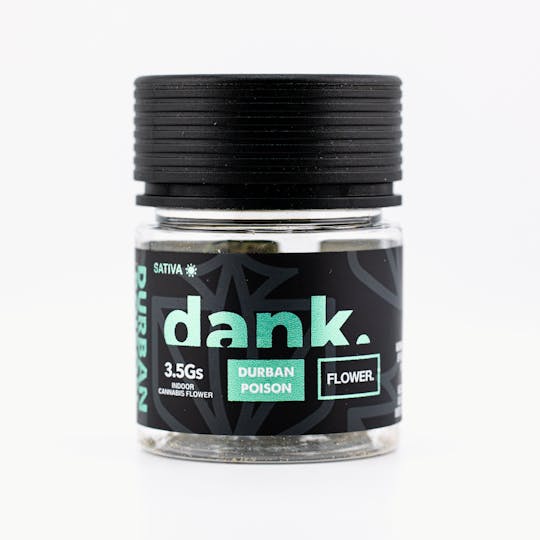
DURBAN POISON
Explore the vibrant energy of Durban Poison, a pure sativa that hails from the bustling port city of Durban, South Africa. Renowned for its sweet aroma and invigorating effects, Durban Poison is your go-to strain for a burst of euphoric clarity and boundless energy. Perfect for powering through a busy day, embarking on outdoor adventures, or igniting a wave of creativity, this strain's oversized resin glands make it a favorite among concentrate aficionados. Each bud is a spectacle of round, chunky glory, heavily coated with trichomes, promising a potent and exhilarating experience. Elevate your senses and productivity with the distinctively uplifting Durban Poison.
- Earthy
- Woody
- Spicy/Herbal
Welcome to Dank!
We are a New York-based cannabis company, founded in 2022 with a passion for providing our customers with the best cannabis products available. We are a brand that prides itself on our love for the culture, and the plant.
Our team consists of experts from the cannabis and hospitality industries, including experienced cultivators, extractors, and processors who are dedicated to producing the finest quality products on the market. We use state of the art technology and techniques to ensure that our products are pure, potent, and consistent.
We offer a range of premium cannabis products, including flower, edibles, concentrates, and vapes, all of which are carefully crafted to deliver a superior experience. We take pride in our commitment to sustainability, using environmentally responsible practices in all aspects of our business.
At our core, we believe in innovation, transparency, and quality. We want to break down stigmas surrounding cannabis use and promote responsible consumption. We are committed to keeping our customers informed with accurate and reliable information so that they can make informed decisions about their health and wellness.
We are excited to be a part of the growing cannabis industry in New York, and we look forward to continuing to provide our customers with the best products and experiences available. Join us on our journey and experience the New York vibe like never before.
DANK YOU for the support!
Durban Poison has deep roots in the Sativa landrace gene pool. The strain’s historic phenotypes were first noticed in the late 1970s by one of America’s first International strain hunters, Ed Rosenthal. According to cultivation legend, Rosenthal was in South Africa in search of new genetics and ran across a fast flowering strain in the port city of Durban. After arriving home in the U.S., Rosenthal conducted his own selective breeding process on his recently imported seeds, then begin sharing. Rosenthal gave Mel Frank some of his new South African seeds, and the rest was cannabis history.
Frank, who wrote the “Marijuana Grower’s Guide Deluxe" in 1978, modified the gene pool to increase resin content and decrease the flowering time. In search of a short-season varietal that could hit full maturation on the U.S. East Coast, Frank’s crossbreeding efforts resulted in two distinct phenotypes, the “A” line and “B” line. The plant from Frank’s “A” line became today’s Durban Poison, while the “B” line was handed off to Amsterdam breeder David Watson, also known as “Sam the Skunkman.”
Durban Poison has a dense, compact bud structure that’s typical of landrace Indica varieties, but the flowers’ elongated and conical shape is more characteristic of a Sativa.


